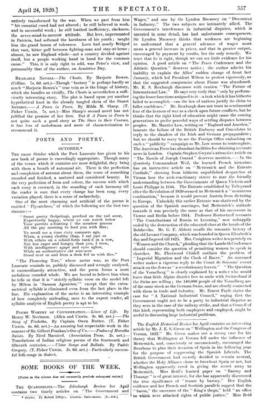SOME BOOKS OF THE WEEK.
[Notice in this column does not necessarily preclude subsequent review.]
• Od,oSer. By Hobart Bridges. London: Heinemann. [5.3. net.]
Wages," and one by Sir Lynden Macassey on " Discontent in Industry." The two subjects are intimately allied. The Government's interference in industrial disputes, which is narrated in some detail, has had unfortunate consequences. Sir Lynden Macassey thinks that workmen are beginning to understand that a general advance of wages must mean a general increase in prices, and that in greater output, encouraged by payment by results, lies the only remedy. We trust that he is right, though we can see little evidence for his opinion. A good article on " The Peace Conference and the Adriatic Question " deserves notice ; the author admits his inability to explain the Allies' sudden change of front last January, which led President Wilson to protest vigorously, so that the suggested compromise about Fiume was abandoned. Mr. R. S. Roxburgh discusses with caution " The Future of International Law." He says very truly that " only by perform- ing the lesser functions assigned to it—a task which it has hitherto failed to accomplish—can the law of nations justify its claim to fuller confidence." Mr. Roxburgh does not trust to sentimental fear of the horrors of war as a check upon future conflicts, but ho thinks that the right kind of education might cause the coming generations to prefer peaceful ways of settling disputes between peoples. Mr. Maurice Low, writing on " England and America," laments the failure of the British Embassy and Consulates to reply to the slanders of the Irish and 'German propagandists ; but we should be sorry to see the Foreign Office embarking on such a " publicity " campaign as Mr. Low seems to contemplate. The American Press has abundant facilities for obtaining accurate news in London. Captain Stephen Gwynn's attractive article on " The Novels of Joseph Conrad " deserves mention.—In the Quarterly Commandant Weil, the learned French historian, has an instructive article on " Metternich and the Entente Cordiale," showing from hitherto unpublished despatches at Vienna how the arch-reactionary strove to mar the friendly understanding between the Governments of Queen Victoria and Louis Philippe in 1844. The Entente established by Talleyrand after the Revolution of 1830 seemed to Metternich a monstrous combination," because it would prevent Austria from dictating to Europe. Unluckily this earlier Entente was shattered by the question of the Spanish marriages, but Metternich's attitude towards it was precisely the same as that of his successors in Vienna and Berlin before 1914. Professor Rostovtzeff recounts " The Contributions of Russia to Learning," now unhappily ended by the destruction of the educated class at the hands of the Bolsheviks. Mr. G. F. Abbott recalls the romantic history of the old Levant Company, which was founded in Queen Elizabeth's day and lingered till 1825. Mrs. Creighton writes temperately on " Women and the Church," pleading that the Lambeth Conference should consider the question of permitting women to speak in churches. Mr. Fleetwood Chidell outlines the problem of " Imperial Migration and the Clash of Races." An unnamed writer makes a vigorous reply to the Count de Soissons' recent attack on the Jews as " a revolutionary leaven." " The Question of the Vorarlberg " is clearly explained by a writer who would leave that little Alpine district free to unite with Switzerland if the Swiss are willing ; the 140,000 people of the Vorarlberg are of the same stock as the German Swiss, and are closely connected with them in trade and industry. Mr. Ernest Fayle states the case for " A National Industrial Council," urging that the Government ought not to be a party to industrial disputes as they were in the case of the railway strike, and that a Council of this kind, representing both employers and employed, might be useful in discussing large industrial problems.


































 Previous page
Previous page